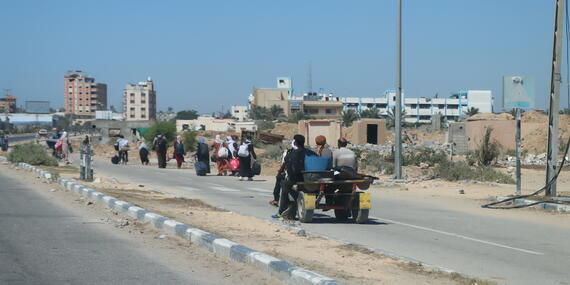Today's top news: Occupied Palestinian Territory, Yemen, Ukraine

Occupied Palestinian Territory
The UN and partners estimate that at least 60,000 Palestinians may have moved toward western Khan Younis in the past 72 hours. This follows yesterday’s order by the Israeli military for residents in parts of central and eastern Khan Younis to immediately evacuate.
On Wednesday, the Israeli military twice ordered people in parts of northern Gaza to evacuate.
OCHA says the parts of northern and southern Gaza newly placed under evacuation this week encompass nearly 43 square kilometres. Initial tracking by our partners in Gaza say these areas include some 230 displacement sites; more than three dozen water, sanitation and hygiene facilities; and five functional health facilities, including the Indonesian Hospital.
More than 80 per cent of the Gaza Strip is now assessed as having been placed under evacuation orders since October of last year.
OCHA says the entry of aid supplies into Gaza remains challenging due to active hostilities, access constraints, high levels of insecurity, the lack of public order and safety, and other factors.
Amid these obstacles, the volume of aid able to be brought from the operational border crossings into Gaza has decreased by more than half since early May, when the Rafah crossing was closed. It has gone from a daily average of 169 trucks in April to fewer than 80 trucks in June and July. At the Kerem Shalom crossing, the decrease was even steeper over the past three months, with a more than 80 per cent drop in aid cargo that was brought into Gaza from that border crossing [127 trucks per day in April to fewer than two dozen each day in July].
Meanwhile, humanitarian assistance missions requiring coordination with Israeli authorities continue to be denied and impeded. OCHA reports that as of yesterday, just 24 of 67 planned aid missions to northern Gaza this month have been facilitated by Israeli authorities. The rest were either denied, impeded or canceled due to security, logistical or operational reasons. Out of nearly 100 planned humanitarian missions in southern Gaza, about half were facilitated by Israeli authorities – but the rest were denied, impeded, or canceled.
Yemen
OCHA reports that the UN and partners are delivering supplies and assistance to people affected by floods in western Yemen.
The situation remains fluid, but initial reports indicate that at least 10,000 families have been affected since Tuesday, when heavy rainfall triggered flash flooding in several parts of Al Hodeidah, Hajjah, Raymah and Al Mahwit governorates, damaging homes, farms and public infrastructure.
This number is likely to increase as more information becomes available. Local authorities have yet to confirm the number of casualties, but dozens of people have reportedly been killed and injured.
The World Health Organization and UNICEF have been delivering much-needed medical supplies to local hospitals and health centres, as well as preparing to deploy dozens of mobile health teams.
Partners have provided immediate assistance – including food, water and hygiene kits – to more than 1,600 people in affected areas, with additional resources being mobilized.
An estimated US$4.8 million will be needed to provide priority support to affected families, but as with almost all of our humanitarian response efforts, underfunding is a major challenge.
Ukraine
Ukraine's outgoing Humanitarian Coordinator, Denise Brown, has condemned a deadly attack that killed and injured dozens of civilians in the eastern town of Kostiantynivka, in the Donetsk Region, just hours ago.
In a statement, Brown said civilians are paying the highest price for the war and underscored that we must not allow this to be normalized.
OCHA reports that escalating hostilities in the Donetsk and Sumy regions over the past two days have killed and injured civilians and damaged the infrastructure they rely on.
Local authorities and aid workers say children were among the nearly 50 civilian casualties and report that a supermarket and school were damaged.
Increasing attacks in the Donetsk Region are deepening the needs of some 60,000 people in impacted communities. The towns of Myrnohrad, Pokrovsk and Toretsk have endured repeated strikes since early August, causing casualties and damage to homes, schools and health facilities, as well as the displacement of nearly 5,000 people.
Despite the risks, many civilians, especially older people, are reluctant to leave. They are struggling to meet their basic needs at a time when ongoing hostilities are making humanitarian access increasingly difficult.
In the face of these challenges, aid workers continue to assist those most affected in the Donetsk Region and those who have fled, including by providing food, hygiene supplies, school materials, cash assistance, and legal and psychological support.
